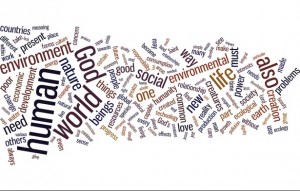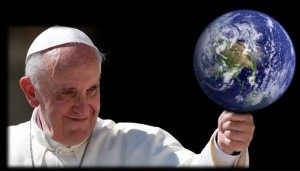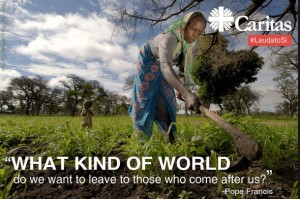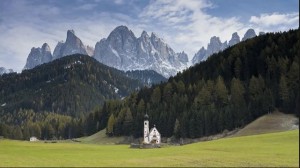I. Context
One of the real challenges facing anyone concerned about the risks from climate change is how to talk about climate change in such a way as to persuade a wider audience to develop a political consensus for climate action.
It is not those closely following the debate that need to be convinced, but those who have heard of climate change and believe that the origins and possible impacts are alleged and not proven, certainly not by mad environmentalists and fuzzy-headed scientists.
To reach these unbelievers, we have urged scientists to talk about climate change like preachers, but they can’t. By and large, they are just too technical. Luckily we have found a preacher talking about climate change, based on sound science, but in a good old fashioned thunderous sermon from the mount. It is most refreshing and offers real chances of reaching a mass audience, instead of just the already converted.
We are speaking about the Papal encyclical, LAUDATO SI’, an intense, passionate plea on the risks of and fight against climate change. It also never strays far from the disastrous impacts of climate change on the most vulnerable communities.
It also provides a spirited criticism of contemporary politics and certain socio-economic forces undermining any commitment to deal with climate change’s impacts, especially on the poor, vulnerable communities. Even specific political structures, countries, and economic sectors are not spared the rod of responsibility.
II. What It Says and How
Much of what is said in the encyclical about the science behind climate change is not new to anyone following closely the debate about climate change. Scientists and environmentalists will likely nod their heads politely and say the Pope has got it largely right. But that is not the point. It is not that the Pope got the science right, but that he got the tone right. And he does not shy away from critically attacking the received wisdom that surrounds current socio-economic structures and their destructive influence on the environment.
Anything that impedes our veneration for the earth receives short shrift.
The opening to the encyclical is powerful, even disturbing in a most unexpected way:
“… our common home [earth] is like a sister with whom we share our life…” “This sister now cries out to us because of the harm we have inflicted on her by our irresponsible use and abuse of the goods with which God has endowed her. We have come to see ourselves as her lords and masters, entitled to plunder her at will,” aided by “The violence present in our hearts…” At ¶1-2
The beginning, underlying, metaphor is that the earth is like our sister on whom we are inflicting harm, whose endowed goods we are abusing, and that we have come to see ourselves as her lords and masters who are entitled to plunder her at will. So whose sister is it? It must be our sister, the sister of the collective “we,” or humanity. And it is “we” who abuse her endowed goods and plunder her at will.
It is hard to read this in any other way but that the despoliation of the earth’s natural resources constitutes, in effect, incestuous rape against our sister. That’s a powerful image. This is no blaming the carnage on “others.” The culprits are us.
That’s exactly where the blame rests. We cannot just shout down the big, bad fossil fuel companies, the blind climate deniers, the indolent political bureaucracies, the crass money-makers and lenders. They all do deserve condemnation, and a nice long stretch (eternity) in hell. But we all participate in these depredations and emissions of greenhouse gases (GHGs), and we all deserve to pay the price. Perhaps many of us will get lucky and only go to Limbo.
From that stark start, the encyclical proceeds to document the abuses and the causes of climate change and, without pulling any punches, those responsible.
An underlying premise in this exposition is that the climate is a common good that belongs to all of us. The earth is a shared inheritance, embodied in the American Indian Chief Seattle’s notion that we borrow the earth from our children to whom we must return it in as good a condition as we received it, if not better.
Technology and Economics
After reviewing the science behind climate change, and the current conditions of our environment, the encyclical explores what blocks our motivation to do something to fix these deteriorating conditions. Perhaps the largest targets are technology and economics.
Our reliance on technology comes in for some sustained attacks. The encyclical makes it perfectly clear that it is not opposed to technological developments, many of which have been instrumental in advancing the interests of poor, vulnerable communities. What is found unsustainable is the “blind confidence in technological solutions” or the “irrational confidence in progress.” At ¶14, 19.
Technology is overloading us through social and other media as well as overwhelming us with tons of data delivered immediately. It all comes so fast. Who can keep up with emails, Tweets, postings, etc. and the attention they demand. As a result we are facing the “rapidification of life and work.” At ¶18, 47.
Such conditions have become static, or noise, that masks the deeper interpersonal relations where one can explore the “mysterious network of relations between things.” For those who remain fixed on the immediate, tech-driven details of their lives, no wonder it is difficult to get their attention for the slow, largely invisible death of the planet around them.
This notion of how technology can be destructive unfortunately is not explored in depth in the encyclical. Nevertheless, it is not unlike the criticism of the widely-respected American scientist Barry Commoner who forcefully argued that many environmental disasters are the inevitable outcome of the technological developments that produce modern conveniences. When toxic chemicals emerge from manufacturing processes, they have to go somewhere; when oil is shipped long distances in single-hull tankers, a breach of that hull releases large quantities of oil; when energy is produced by controlling nuclear fusion, human error can cause the loss of that control. We live with the by-products of what we manufacture. We are what we make.
A new power structure is being built on a techno-economic paradigm that overruns notions of freedom and justice. The adherents of this new paradigm offer only “superficial rhetoric, sporadic acts of philanthropy and perfunctory expressions of concern for the environment, whereas any genuine attempt by groups within society to introduce change is viewed as a nuisance based on romantic illusions or an obstacle to be circumvented.” At ¶54. Life has become less rich and beautiful as a result of the intervention of a few in service of business interests and consumerism. At ¶s 189-193.
It almost seems to border on heresy to attack market-driven consumer-fed economics these days, but then popes are experienced in dealing with heresy.
The encyclical almost rails against the economics of extreme consumerism, and those who promote it. ¶203 et al. As it says, “Purchasing is always a moral — and not simply economic — act.” ¶206. Even fans of iPhones and other smart phones must pause once in a while to consider whether yet another version of the phone is really necessary for society. If that does not give pause, perhaps the added cost of staying current with the latest technology that is making your older version useless might raise some concerns. Does the developing world need more and more air conditioners and their drain on energy.
The encyclical boldly supports those calling for living with less, not more. ¶s 222-223. In response to counter arguments that there is no need to live with less because we have infinite and unlimited power and resources, the Pope calmly says this is a lie. ¶106. Perhaps the rich and well-defended, psychologically and economically, may feel they are protected, and they probably are, but they cruelly ignore the rest of the world that is not privileged but vulnerable to the adverse impacts that climate change is rapidly dumping on all of us.
The same mindset that blocks action on the environment marginalises the poor and vulnerable. As noted, besides covering the science of climate change and its impacts, and the blocks to action on the environment, the encyclical never strays far from giving voice to the needs of the poor and vulnerable, including indigenous communities. A different mindset, the ecological approach, allows for considerations of justice and distribution as well as for environmental concerns. The encyclical calls for us to hear “both the cry of the earth and the cry of the poor.” At ¶49. At times the plea crosses over from socio-economic-science discourse into spirituality, and that is refreshing. After all, he is the Pope.
Other Concerns
Other sectors and activities also receive scrutiny.
Law is regarded as worthless if ignored. For example, there are countries that enact legislation to protect forests but the leaders keep silent and watch the laws repeatedly broken. We certainly do not have to stretch our imagination to think of several countries that would fit this bill. At ¶142. Moreover, the encyclical criticizes laws and regulations in general as being insufficient in the long run to curb bad conduct unless they instill long-term habits. At ¶211.
The encyclical raises concerns about the privatization of natural resources that are turned into yet another commodity controlled by market forces. Such dangers are especially dangerous for resources like water, which is getting more scarce as a result of climate change. At ¶s 28-31.
Even green spaces in cities are criticised as counterproductive where green spaces serve only the “safer” areas of the city, while the disposable of society are ignored and deprived of such amenities.
The UN RIO +20 conference is described as a “wide-ranging but ineffectual outcome document.” ¶169.
The encyclical argues that fossil fuels, especially coal, but also gas, need to be “progressively replaced without delay.” It also notes that that less harmful alternatives or short term solutions may be needed until renewable energy becomes widely available. ¶165. At the same time the encyclical rejects buying and selling “carbon credits,” as in cap and trade systems, because it seems to provide a “quick and easy solution” and not the “radical change which present circumstances require.” ¶171 It is a relief to find a moralist rejecting cap and trade, and urging something more radical, arguably such as a carbon tax.
Locally owned energy cooperatives (¶179), Environmental Impact Assessments (EIA), and the precautionary principle are all praised as protective both of the environment and vulnerable communities. At ¶s 183,186.
III. Implications
In a seminal statement at the beginning, the encyclical states that “Our goal is not to amass information or to satisfy curiosity, but rather to become painfully aware, to dare to turn what is happening to the world into our own personal suffering and thus to discover what each of us can do about it.” At ¶19. The vast majority of people will resist turning anything into their own personal suffering. Much of their personal energy is spent avoiding any inconveniences, let alone suffering. Nevertheless it is good to hear a preacher and moralist remind us that we all need to live with less, not more, and to so identify with the suffering of those impacted the most by climate change that their suffering becomes our own. Until that happens, those in the developed world with the resources to adapt will continue to ignore the urgency of climate action. One could hope that the consequences of climate change may become so extreme that even these people will be affected and finally act, but then that’s a suicidal wish (we’ll all pay for more extreme events).
For some time it has been clear that the science on climate change is settled, and that the risks from climate change worsen with each new report, each passing year. Yet still we have all those advocating for or implementing backward, reactionary policies and regulations to foster yet more reliance on fossil fuels of all kinds, including the UK Conservative government of David Cameron, the radically reactionary Tea Party Republicans in the US, the Tony Abbott administration in Australia and the Stephen Harper government in Canada. And that only identifies some of the English-speaking political structures to blame for a lack of real progress on climate action.
Hopefully their constituents and/or more moderate, progressive mindsets on climate action will hear, and feel, the passion in the encyclical and come to realize that these reactionary administrations are serving the very interests identified and excoriated by the Papal encyclical, Laudato Si’.
Sources
ENCYCLICAL LETTER LAUDATO SI’ OF THE HOLY FATHER FRANCIS ON CARE FOR OUR COMMON HOME w2.vatican.va/content/francesco/en/encyclicals/documents/papa-francesco_20150524_enciclica-laudato-si.html
Jason Hickel, Martin Kirk, Joe Brewer, “The pope v the UN: who will save the world first?” The Guardian (23 June 2015). www.theguardian.com/global-development-professionals-network/2015/jun/23/the-pope-united-nations-encyclical-sdgs
Brad Plumer, “Pope Francis is urging the world to act on climate change. Here are his key points.” Vox (18 June 2015). www.vox.com/2015/6/16/8788813/pope-francis-climate-change
David Roberts, “College students are making global warming a moral issue. Here’s why that scares people.” Vox (29 April 2015). www.vox.com/2015/4/29/8512853/fossil-fuel-divestment
Stephen P. White, “The pope’s climate change message is really about rethinking what it means to be human,” Vox (24 June 2015). www.vox.com/2015/6/24/8834413/pope-climate-change-encyclical
Rosie Scammell, “Pope Francis recruits Naomi Klein in climate change battle,” The Guardian (27 June 2015). www.theguardian.com/world/2015/jun/28/pope-climate-change-naomi-klein
Damian Carrington, “Fossil fuel firms risk wasting billions by ignoring climate change, says IEA,” The Guardian (9 July 2015). www.theguardian.com/environment/2015/jul/09/fossil-fuel-firms-risk-billions-ignoring-climate-change-iea
“Pope urges youth to save planet,” Irish Independent (8 July 2015) www.independent.ie/world-news/pope-urges-youth-to-save-planet-31360851.html
Carmela Fonbuena, “Philippines to raise 10m signatures for pope’s climate petition,” The Guardian (22 July 2015). www.theguardian.com/world/2015/jul/22/philippines-to-raise-10m-signatures-for-popes-climate-petition
Joe Romm, “Numbers Numb, Stories Sell: The Secrets Of Climate Communications,” Climate Progress (30 July 2015). thinkprogress.org/climate/2015/07/30/3678680/numbers-numb-stories-sell/
Bill McKibben, “The Pope and the Planet,” The New York Review of Books (13 August 2015). By subscription: www.nybooks.com/articles/archives/2015/aug/13/pope-and-planet/
Barry Commoner, “Failure of the Environmental Effort,” Environmental Law Reporter 18: 10195 (June 1988). In Robert Emmet Hernan, This Borrowed Earth: Lessons from the 15 Worst Environmental Disasters Around the World, published by (PalgraveMacmillan, February 2010, in English and by China Machine Press, December 2011, in Chinese.







No comments yet, add your own below